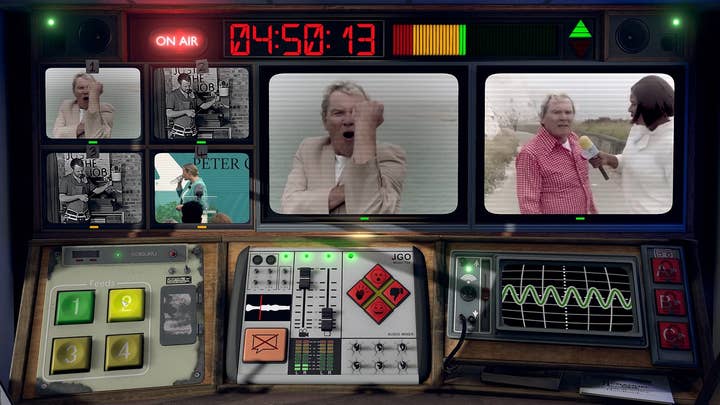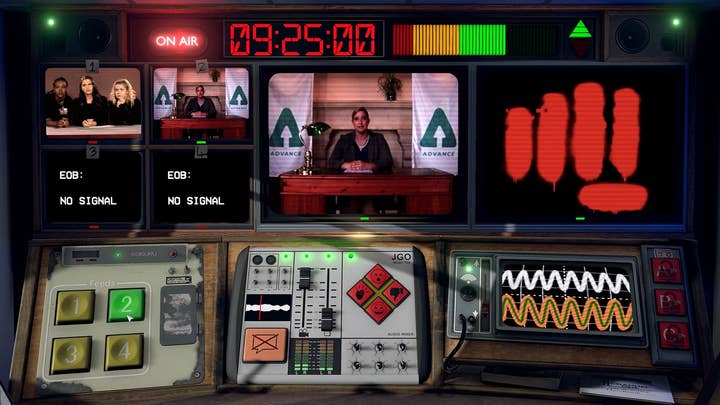Why would you launch a bleeping FMV game in 2022?
NotGames' Alex Paterson and Denis Sewell look to carve a path to FMV genre dominance with the dystopian TV production title Not For Broadcast
The first question with just about any interview about a modern full-motion video (FMV) game is an obligatory, "Why?"
Why would you choose to work in a creative field that was thoroughly salted with the explosion of terrible early CD-ROM games in the mid-'90s and has only shown faint glimpses of life (Her Story and Bandersnatch among them) since then?
Speaking with GamesIndustry.biz in advance of this week's launch of the FMV game Not For Broadcast, NotGames directors Alex Paterson and Denis Sewell share some of their thoughts on the matter.
"FMV is a very small niche, and we're trying to dominate that niche and be the leaders in that niche in the industry," Sewell says.
"I understand the reasons why people don't use FMV, and we've hit a lot of those struggles -- size of game, budget, all these challenges we've hit along the way -- but coming up with clever ways to get around that in a very clever, different way that isn't just the old school FMV where you click a button, turn left and get a pop-up video of some guy on a green screen telling you to go over there."
He adds that the team already had an abundance of relevant experience for an FMV game. Sewell had worked in TV and film prior to NotGames, and much of the team had similar backgrounds. That wasn't entirely a matter of chance, as they had all met while working for a theater charity.
"We're all kind of theatrical people and were trying to find a way to turn that into a game, use our skills and our [unique selling point], or whatever, and make that work for us," Paterson says.
He acknowledged that the 2015 FMV game Her Story had originally started him thinking about working in the genre because it showed how FMV could be used diegeticly; he liked the idea of watching video being baked into the premise of the game.
The idea took further shape the day he came across a Free Tibet rally in London while walking back home from work one day. He realized that the rally could be covered on the news and slanted in distinctly different ways depending on what angles and footage were chosen for broadcast and which were left aside.
"We always kind of knew it was going to be dystopian, that was really the only thing we had in the beginning"
Alex Paterson
Paterson roughed out an idea for a video editing interface and the team cobbled together a prototype using footage from music videos their friends' bands had made.
"Making TV is fun," Paterson says in explaining the thought process. "That looks fun, I bet that editing TV is fun. So we knocked up a little something and yeah, it turns out it is quite fun."
As for the narrative they would tell with this premise, that started with a concept more than a concrete story.
"We always kind of knew it was going to be dystopian, that was really the only thing we had in the beginning: Some sort of TV studio where you're in the gallery and it's probably going to be dystopian," Paterson says.
But why go for a dystopia specifically?
"Beeping out swear words, that's fun, obviously," he explains. "Cutting cameras, you're choosing what to show and what not to show. So then the world and everything develops from there. What aren't you allowed to show on TV?
"At the beginning you're censoring really silly, made-up swear words that sound funny. And later on, when you're censoring ideas, suddenly (we hope) that jarring contrast... can start to feel sinister."
There's clearly a satirical edge to that progression, but effective satire is a difficult tightrope to walk these days.
"It's really difficult at the moment to be satirical, because it's so extreme. The world is so mad"
Denis Sewell
"What tends to happen is these guys will write something we think is so far-fetched and out of the realms of possibility, and then months down the line it actually happens," Sewell says. "It's really difficult at the moment to be satirical, because it's so extreme. The world is so mad."
Paterson says they tried to avoid being too topical or taking shots at specific targets in favor of more generalized critiques of intractable problems unlikely to be cleared up anytime soon.
"I do think to a certain degree, certain parts of media and entertainment in general tend to go a bit fluffy and sometimes it's easier to go for what will sell and following money instead of art, or the truth, or whatever you want to call it," Paterson says. "And we just wanted to explore what that would be to take it to its absolute extreme."
At the same time, NotGames wrestled with the marketing of Not For Broadcast, and where the game itself should be positioned on that spectrum of entertaining fluff to art/truth/whatever.
"We never really saw ourselves as an FMV team, but when we discovered that gamifying TV was fun, there was this real challenge to convince people that it is," Paterson says. "The word 'stigma' is a bit strong, but there's a feeling about FMV games being a certain type of game. Trying to convince people to cross that barrier has been tough. In some ways, leaving out parts of the FMV and not going super-hard on the FMV side of it has been a tactic we tried."

Sewell says the team alternatingly tried to both "go dark" and "go funny," which caused problems thanks to the Early Access format the team used to make the game.
The original trailer was intentionally trying to cultivate a bleak future Black Mirror vibe, but the first segments released to the playerbase were still in that early phase of the game where things are intended to be lighter and sillier.
"In terms of the content that was actually out, it was all kind of fun at that point," Paterson says. "It takes a darker turn later in the story, but people felt it was kind of mis-sold. It really is about trying to balance expectations."
While Sewell says there was some initial resistance on the dev team to the idea of the game using an Early Access release plan, the process has made the game significantly better "because it's given us time to breathe on the story."
Not For Broadcast was originally planned to have ten chapters in all, but the Early Access process gave the developers time to reassess it partway through, trim some fat, and cut it down to a nine part "trilogy of trilogies" that worked better and helped give the game a more focused sense of momentum.
"The last third of the game really motors along once you get towards the end, because we really took out any breathing space," Paterson says. "But I think the game has really benefitted from it."
Beyond the narrative, the team has also had time to iterate on the gameplay mechanics with the help of its Discord community.
Early Access hasn't been a purely positive experience for the team, as Paterson acknowledges it didn't quite fit his own creative process ideally.
"Something we keep repeating in the office is 'We can't Game of Thrones the ending'"
Alex Paterson
"When you're working on a creative project, it's all very well when you're locked away in your private secret corner and then you show your finished thing to the world," he says.
"What is more difficult for me -- I don't know about everyone else -- is people know you're working on it now.
"The flip side of having all those wonderful supportive community members is also that panic of there being people waiting for this now, and it had better be good because if it's not, they're going to be mad. There's definitely an added level of pressure I was not really expecting."
Paterson likens it to the pressure one would feel working on a popular TV show, saying, "Something we keep repeating in the office is 'We can't Game of Thrones the ending.'"
With Not For Broadcast finally finished and out, NotGames is considering its next project. And while they aren't ready to talk about it in any detail, there's clearly an appetite to further explore the possibilities of FMV.
"We're not done here yet," Paterson says. "Part of me would just love to throw this whole game away and start again and do it better from the ground up, but instead I think we'll take that onto another game and there's a lot more we can still do."
Sewell echoes the sentiment, saying, "It's almost like we've been mining away at this idea of FMV and we can see a little crack of what could potentially be an absolute gold mine of how good FMV will be."


